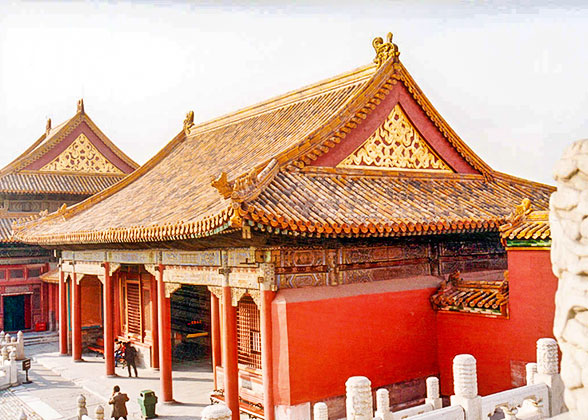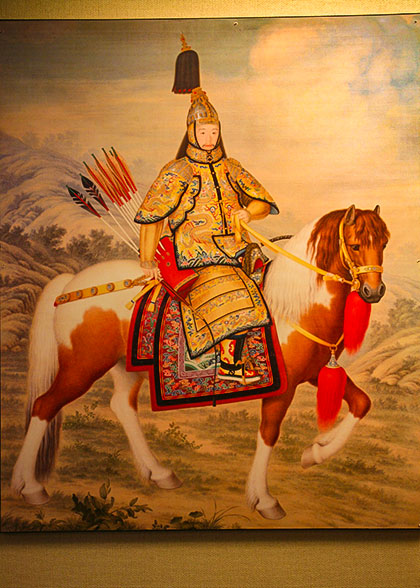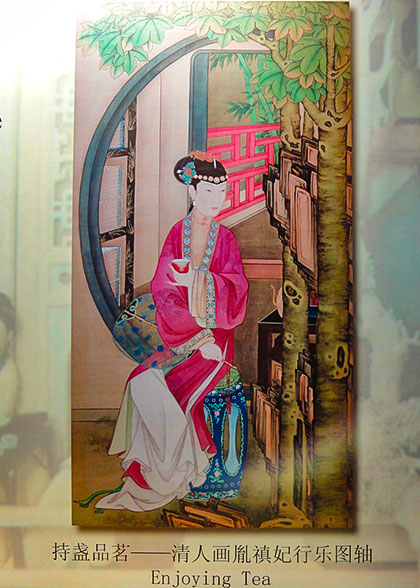Hall of Literary Glory (Wenhuadian)
Entering from the south main entrance of Forbidden City - Meridian Gate, you will see the Inner Golden River Bridges. To the east of the bridges is the Gate of Unified Harmony (Xiehemen) leading to the Hall of Literary Glory (Wenhuadian or Wenhua Hall).
Standing symmetrically with the Hall of Martial Valor (Wuyingdian) to the west of the Golden River Bridges, the Hall of Literary Glory is an elegant building of the Outer Court. The building is an I-shaped structure with a lobby connecting front and back halls. The front one, facing south, is five bays wide and three bays deep. It has a single-eaved roof with yellow-glazed tiles. The back is the Hall of Significance and Respect (Zhujingdian), a similar structure to the front hall but less deep. Additionally, there are side buildings, the Hall of Benevolence (Benrendian) in the east and the Hall of Righteousness (Jiyidian) in the west.
In terms of architectural layout, the Hall of Literary Glory is the right wing of the three grand halls of the Outer Court; in terms of function, it is a complementary to those three. Established in the Ming Dynasty (1368-1644), it first served as the main hall of the prince and covered with green-glazed tile according to the theory of five elements of the ideology of the Taoism. However, as the prince was too young to administrate government affairs, it was used as one palace of the Emperor's in the fifteenth year of the reign of Ming Jiajing (1521-1567) and the tile was changed to yellow. Now, it serves as Painting Gallery.
 |
| Hall of Literary Glory |
The famous reading reports ceremony of the emperor was held here. The emperor had to compose reports on their study of "the Four Books (the Great Learning, the Doctrine of the Mean, the Analects of Confucius, and the Mencius) and Five Classics (Classic of Changes, Classic of Poetry, Classic of Rites, Classic of History, and Spring and Autumn Annals)". The Emperor of the Qing Dynasty presented their reports twice, in Chinese once and in Manchu once, during which the civil ministers listened with their knees down to the floor. Emperor Kangxi (1661-1722), Yongzheng (1722-1735) and Qianlong (1735-1796) were all highly accomplished. They may order civil ministers to debate when they felt the need. And then, everyone is offered a cup of green tea for a rest. At last, the emperor would take the civil ministers to the Pavilion of Literary Profundity (Wenyuange), lying behind it, to read the books as the special encouragement to those who were lucky to attend the ceremony.
Painting Gallery
The Hall of Literary Glory now serves as the Painting Gallery of the Forbidden City (Palace Museum), housing plenty of ancient Chinese paintings, among which there are the rare and only works of the Jin, Tang, Song and Yuan Dynasties and the masterpieces of the different painting groups of the Ming and Qing Dynasties. Exhibitions are held each year but some top copies or works as national treasures seldom show their faces. In view of the protection of the classics, short time displays are available only if the temperature and humidity are suitable, mostly in every September and October. Tourists are not allowed to take pictures in the Painting Gallery. However, there is a slides room and several video devices for tourist to photograph yet without flash.
|
|
Tip: The Painting Gallery shares the same opening hours with the Forbidden City, and requires no additional entrance fee.
![]() Next:
Next:
Go west back to the Taihemen Square, and continue the tour along the central axis.![]() Gate of Supreme Harmony (Taihemen)
Gate of Supreme Harmony (Taihemen)
Go east to the East Prosperity Gate (Donghuamen) to see the Ancient Architecture Museum. ![]() Further Reading: How to visit the Forbidden City
Further Reading: How to visit the Forbidden City

